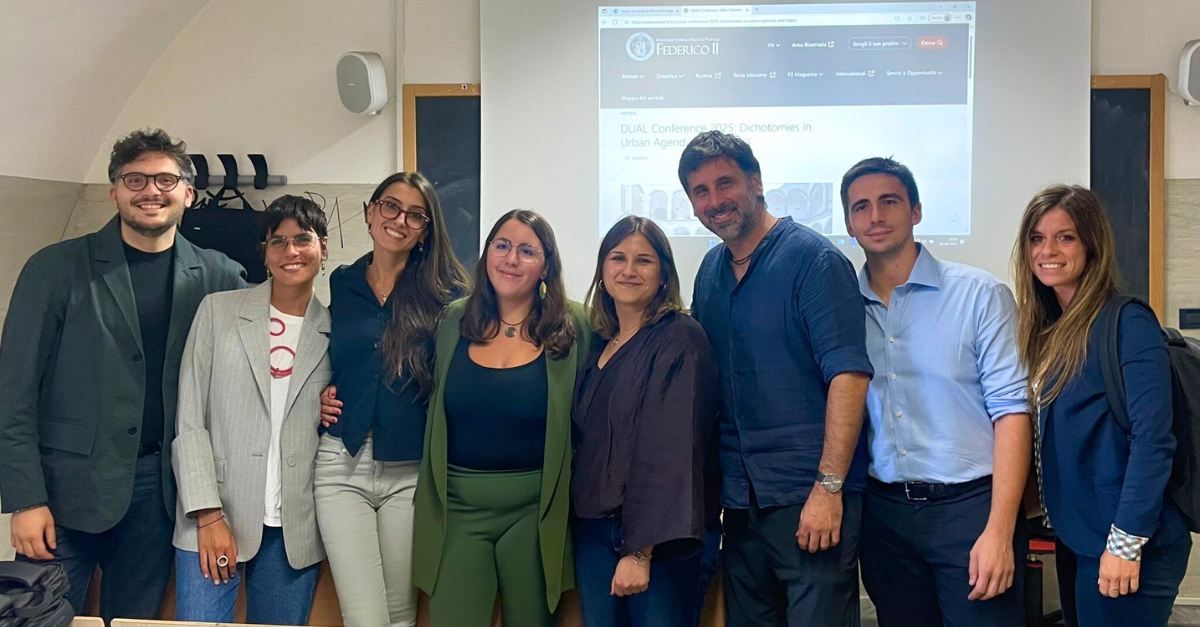DUAL Conference 2025: Dichotomies in Urban Agendas and Logics
On 29 and 30 September 2025, the Università Federico II of Naples (UNINA) hosted the Aurora Academic Conference DUAL: Dichotomies in Urban Agendas and Logics, bringing together distinguished scholars, researchers and practitioners. Jointly organised by the University of Duisburg-Essen (UDE) and UNINA, the conference reflected Aurora network’s commitment to collaborative research and dialogue across European institutions.

Held at the Department of Humanities, the two-day event explored the complexities of urban design, cultural identities, and social well-being. It provided a unique forum for dialogue on how cities embody and negotiate contrasting dynamics between branding and dissent, identity and transformation, and aesthetics and functionality.
The opening session was introduced by Alessandro Arienzo, Aurora Institutional Coordinator and UNINA. His introduction was followed by Francesca Scamardella, Coordinator for Aurora 2030 task team on the Aurora hub for Cultures: Identities and Diversities. For the purpose of the conference, Scamardella framed the upcoming discussions within the broader context of establishing this Aurora hub.
Rich Transversal and Transdisciplinary Sessions
Over the two days, the conference covered four major sessions, and included a keynote lecture that set the tone on the multiple dichotomies existing in cities and urban spaces, that cut across its material, social, political and symbolic dimensions:
Urban Design and Dichotomies
Chaired by Ramon Rispoli, Associate Professor of Design at the Department of Architecture, and Benedetta Toledo, doctoral candidate from UNINA, Session 1 examined “Urban Design and the City’s Dichotomies”. The session opened with a reflection on the “Napoli experience. Between city branding and aesthetics of dissent” (Rispoli and Toledo). The conversation highlighted Naples as a living laboratory where urban narratives are continuously redefined by its cultural and social tensions.
Humanities Perspectives in Dialogue
Session 2 was chaired by Zohra Hassan-Pieper, Aurora 2030 Work Package 2 Project Manager from UDE. It explored “Humanities Perspectives on Urban Dichotomies”, beginning with the thought-provoking introduction “Urban Dichotomies in the Arts”. Their interdisciplinary approach emphasised the centrality of culture and artistic expression in shaping collective urban imaginaries.
Holism, Wellbeing, and Case Studies
The second day opened with a keynote lecture by Bertram Niessen, President and Scientific Director of cheFare. Entitled “Heaven, Hell and the Microcosms. Dualism and holism in metaphors and imaginaries of the City”, Niessen’s contribution invited participants to reconsider the metaphoric and symbolic dimensions of urban life.
Session 3 further deepened the discussion with an introduction by Martina Bosone and Francesca Nocca, both from the Department of Architecture at UNINA. They presented “Wellbeing and not-wellbeing in Naples: the community’s perspective. Development of a collaborative map”. Giovan Giuseppe Monti from UNINA followed with a historical perspective through “The Republic of Venice in the 17th century as a case study”.
In the final session, all themes from the first three sessions and the keynote lecture converged to bring “Grounded Dichotomies: Case Studies”. Chaired by Martina Bosone and Giovan Giuseppe Monti, the session underscored the importance of case-driven research for understanding how dichotomies manifest in specific urban contexts and how they can inform policy, planning, and community engagement.






Closing Reflections
The conference concluded with final remarks by Francesco Casalbordinio and Maria Fierro of UNINA, who emphasised the collaborative spirit of Aurora in fostering interdisciplinary and transnational dialogue.
The DUAL conference reaffirmed Aurora’s mission to integrate diverse perspectives and methodologies, advancing research and education that respond to the challenges of contemporary urban life. Through the contributions of chairs and speakers, the event highlighted the power of academic cooperation in addressing the complexities of our cities, making visible the tensions and opportunities that shape the future of urban societies.
